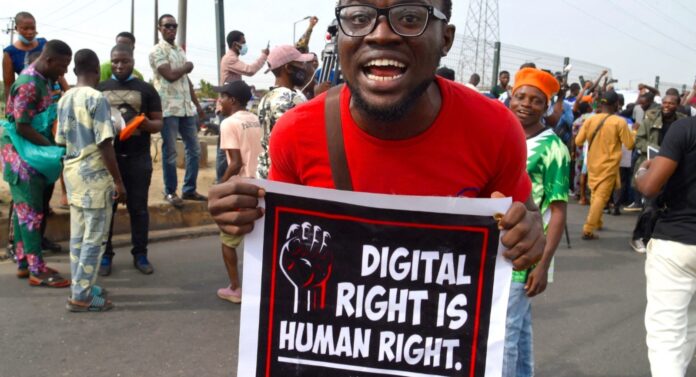Iortyom Ushahemba Moses
In the grand theater of capitalist democracy, where the illusions of freedom mask the iron chains of exploitation, Nigeria under President Bola Ahmed Tinubu’s administration stands as a stark exemplar of how the ruling class deploys the rhetoric of “democracy” to perpetuate inequality and suppress the proletariat. Since assuming office in May 2023, Tinubu’s regime, rooted in the neoliberal playbook of the All Progressives Congress (APC) has presided over a systematic erosion of democratic rights and freedoms. From the violent quashing of protests to the entrenchment of economic disparities, this administration exemplifies the Marxist thesis that bourgeois democracy serves not the masses, but the accumulation of capital for the elite. As socialists, we must unmask this facade, drawing on empirical data to expose how Tinubu’s policies have intensified class antagonisms, leaving the working poor to bear the brunt of austerity while the bourgeoisie revel in impunity.
At the heart of Tinubu’s “Renewed Hope” agenda lies a commitment to neoliberal reforms that prioritize market deregulation over social welfare, a hallmark of capitalist exploitation. The removal of fuel subsidies in May 2023, touted as a bold step toward fiscal responsibility, triggered an immediate surge in inflation and poverty rates, disproportionately affecting the urban and rural proletariat. According to the National Bureau of Statistics (NBS), Nigeria’s inflation rate skyrocketed to 34.19% in June 2024, the highest in nearly three decades, with food inflation reaching 40.87% a direct assault on the living standards of the working class. This economic shock has pushed an additional 13 million Nigerians into multidimensional poverty, bringing the total to over 104 million people living below the poverty line in 2024, as reported by the World Bank. In socialist terms, this is not a mere policy misstep but deliberate class warfare: the subsidies’ removal transferred billions from public coffers to private oil barons, many of whom are aligned with the APC elite, while the masses grapple with fuel prices that have more than quadrupled.
Freedom, in the Marxist sense, is inextricably linked to economic emancipation. Yet under Tinubu, the Gini coefficient a measure of income inequality has worsened, standing at 35.1 in 2023 and projected to rise further amid ongoing reforms, according to the African Development Bank (AfDB). The wealthiest 1% now control over 50% of the nation’s wealth, per Oxfam’s 2024 Inequality Report, while wage stagnation and job losses in the informal sector where 80% of Nigerians toil have rendered the right to a dignified life a hollow promise. This is the bourgeois state in action: using “economic freedom” to justify the plunder of communal resources, echoing Lenin’s critique of imperialism as the highest stage of capitalism.
Democratic rights are meaningless without the freedom to dissent, yet Tinubu’s administration has wielded the security apparatus to crush voices of opposition, revealing the coercive underbelly of the capitalist state. The #EndBadGovernance protests in August 2024, sparked by soaring living costs, saw security forces kill at least 13 demonstrators and arrest over 1,000 across major cities, according to Amnesty International’s September 2024 report. In Lagos alone, over 200 protesters were detained without trial, with reports of torture and extrajudicial killings documented by Human Rights Watch (HRW) in their October 2024 briefing. This echoes the 2020 #EndSARS uprising, but with heightened impunity: under Tinubu, the government has invoked the Cybercrimes Act to prosecute over 50 social media users for “cyber stalking” critical posts, stifling freedom of expression.
From a socialist perspective, these crackdowns are not aberrations but the inevitable response of the ruling class to threats against their hegemony. The Freedom House 2024 report downgraded Nigeria’s status to “Partly Free,” citing a score of 45/100 for political rights and civil liberties, a decline from 49/100 in 2023, largely due to increased harassment of journalists and opposition figures. The arrest of over 30 Labour Party members in 2024 on fabricated charges, as per the Civil Liberties Organization (CLO), further illustrates how the state apparatus protects capitalist interests by criminalizing class struggle. In Marx’s words, “The executive of the modern state is but a committee for managing the common affairs of the whole bourgeoisie.”
The judiciary, ostensibly the guardian of democratic freedoms, has been co-opted under Tinubu to serve elite interests, undermining the rule of law for the masses. Transparency International’s Corruption Perceptions Index (CPI) ranked Nigeria 145 out of 180 countries in 2023, with a score of 25/100, and early 2024 indicators suggest no improvement, amid scandals involving APC loyalists. The controversial suspension of the Chief Justice of Nigeria in August 2023, perceived as a purge of anti-Tinubu elements, led to a 15% drop in public confidence in the judiciary, according to a 2024 Afrobarometer survey where only 42% of respondents trusted courts to deliver fair verdicts.
Socialists view the judiciary not as a neutral arbiter but as an instrument of class domination. Under Tinubu, high-profile corruption cases against opposition figures have been stalled or dismissed, while APC affiliates evade prosecution exemplified by the ongoing Emefiele trial, where delays have allowed the former Central Bank governor (a Tinubu ally) to retain influence. This selective justice perpetuates inequality, as the poor face swift incarceration for petty offenses, with prison overcrowding at 70% over capacity per the Nigerian Prisons Service 2024 report.
Tinubu’s administration lays bare the contradictions of bourgeois democracy: freedoms proclaimed for the elite, repression reserved for the toiling masses. With poverty afflicting 133 million Nigerians (per NBS 2022 data, exacerbated post-2023), and democratic backsliding evident in the Economist Intelligence Unit’s Democracy Index (Nigeria scored 4.23/10 in 2023, a hybrid regime), the call for socialist revolution grows louder. True democratic rights demand the overthrow of capitalist structures, replacing them with worker-led governance where economic freedom is realized through collective ownership. Nigerian workers and youth must unite, drawing inspiration from global socialist movements, to dismantle this exploitative order. The struggle continues solidarity forever!



